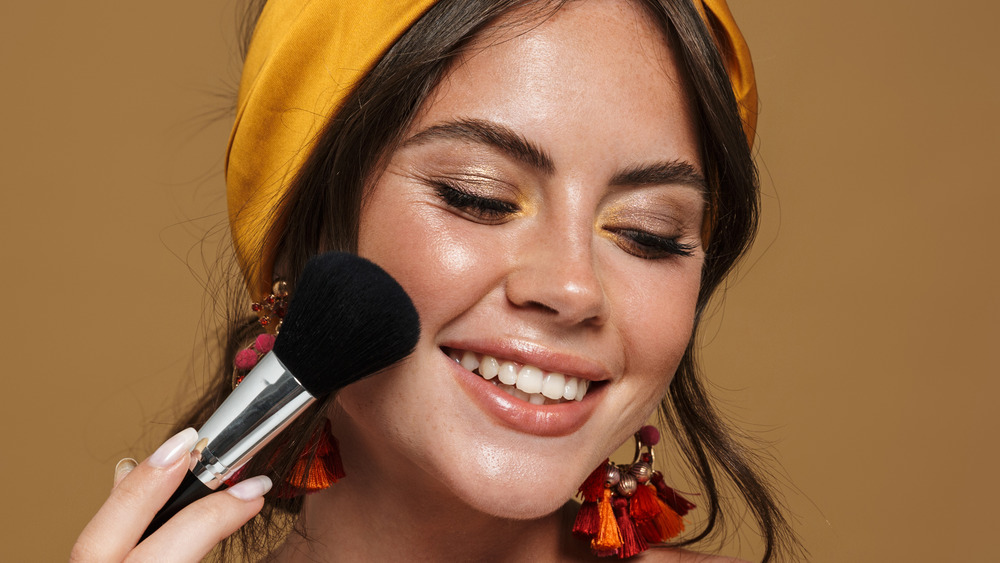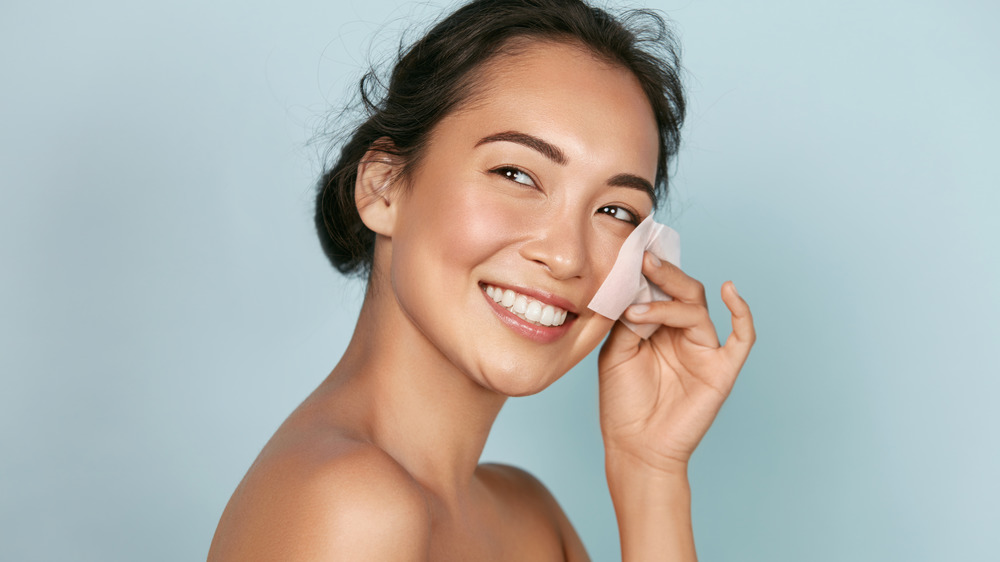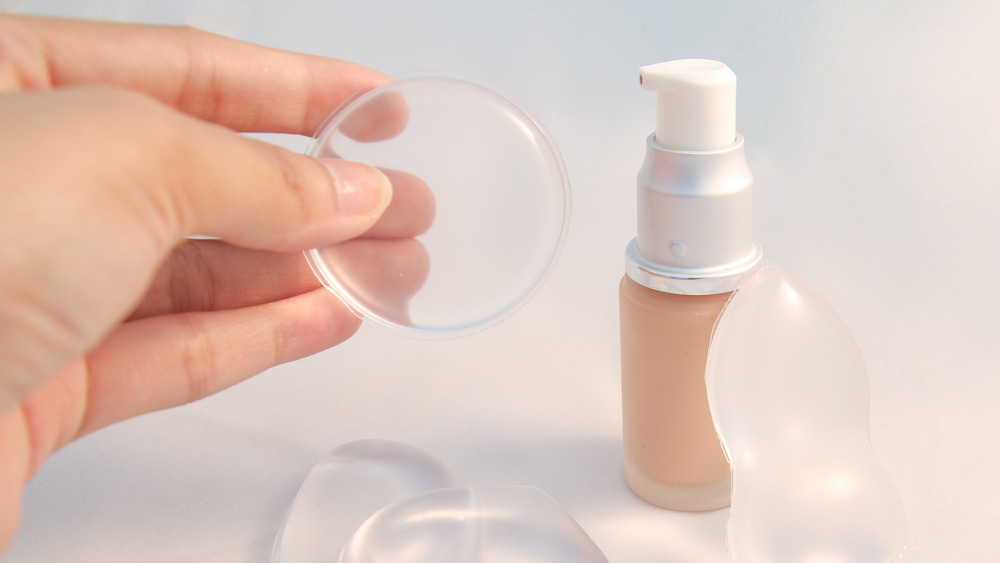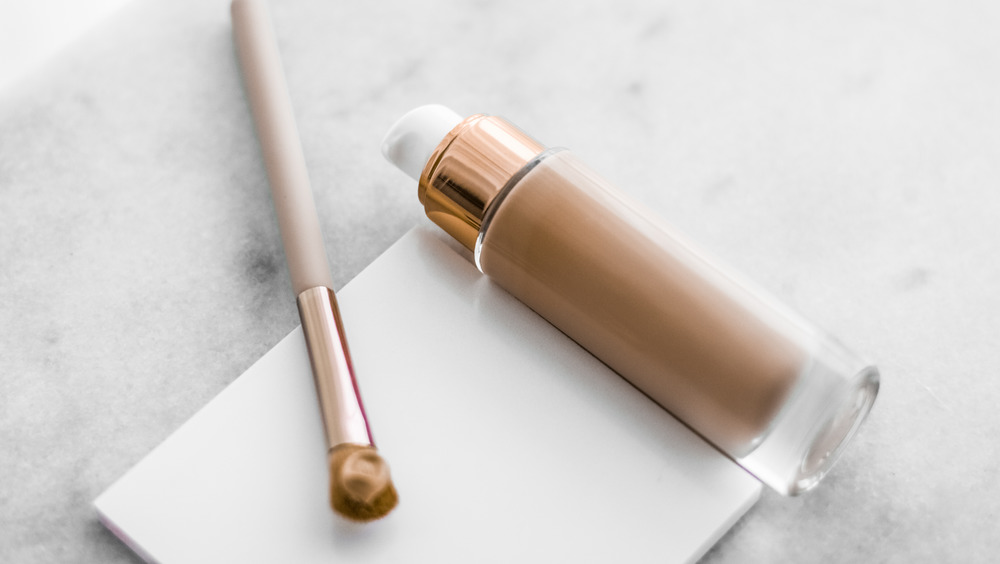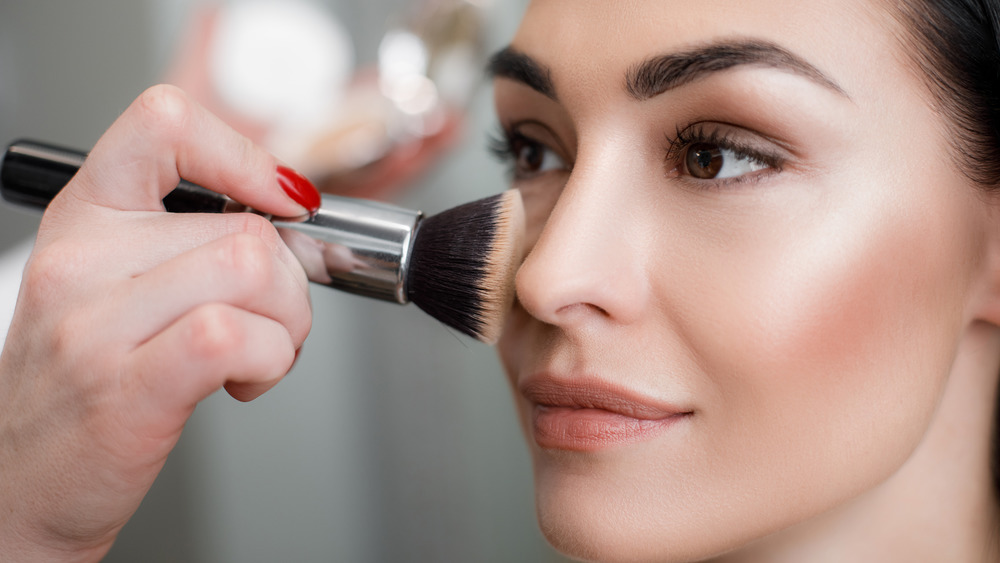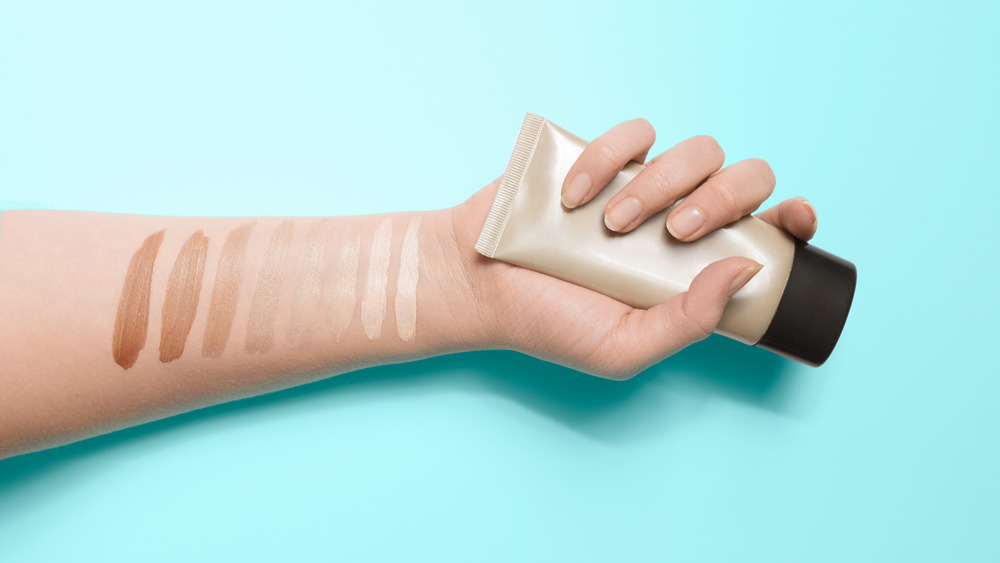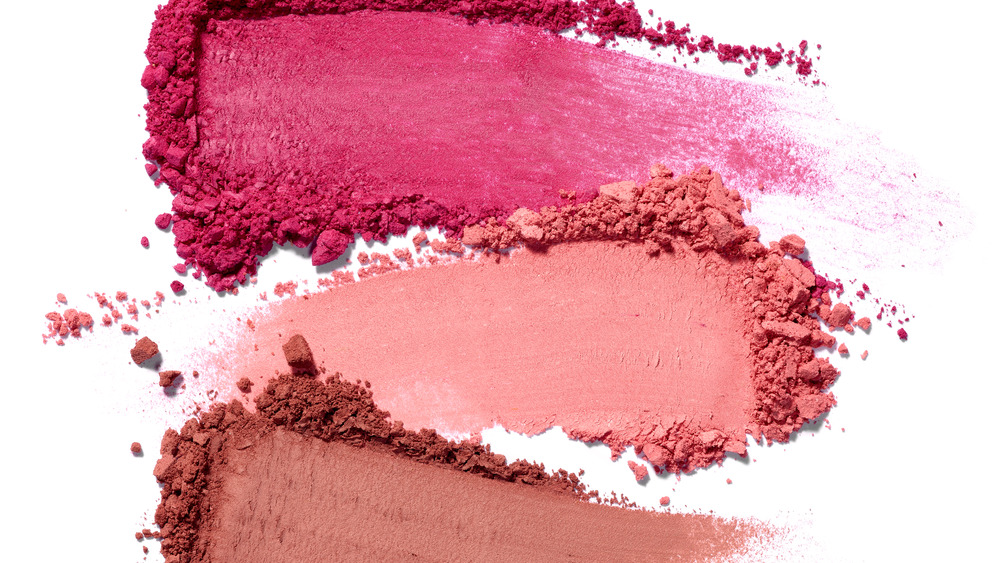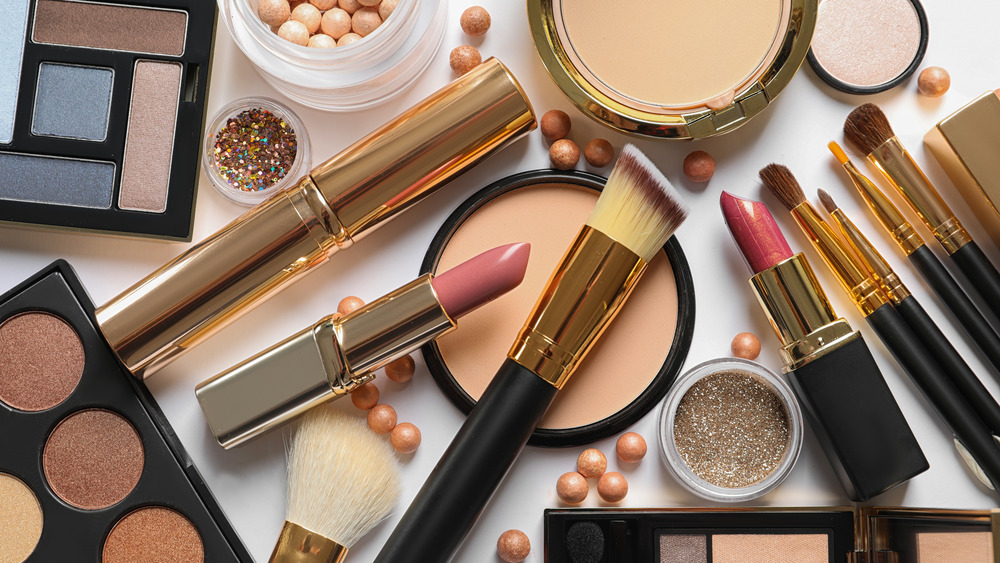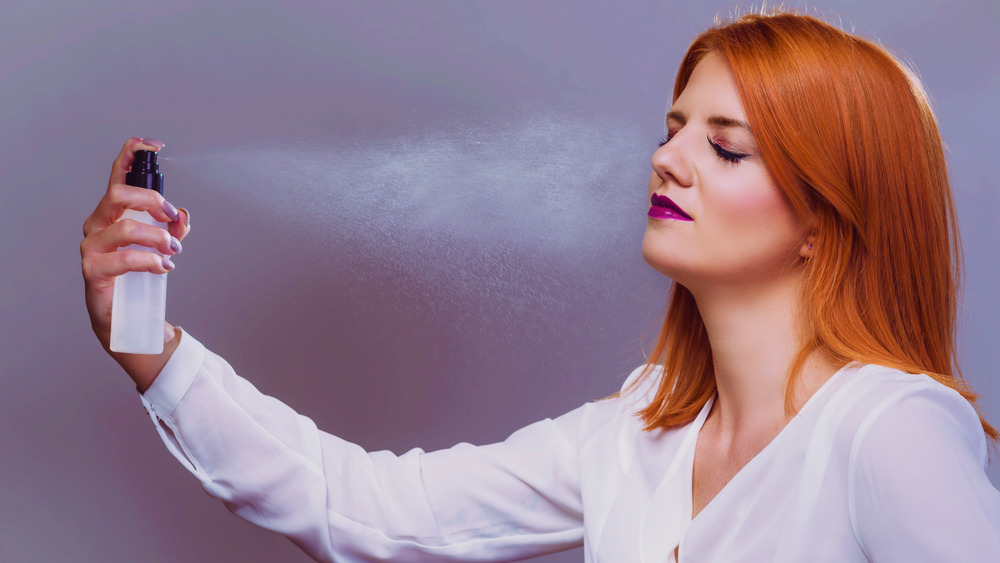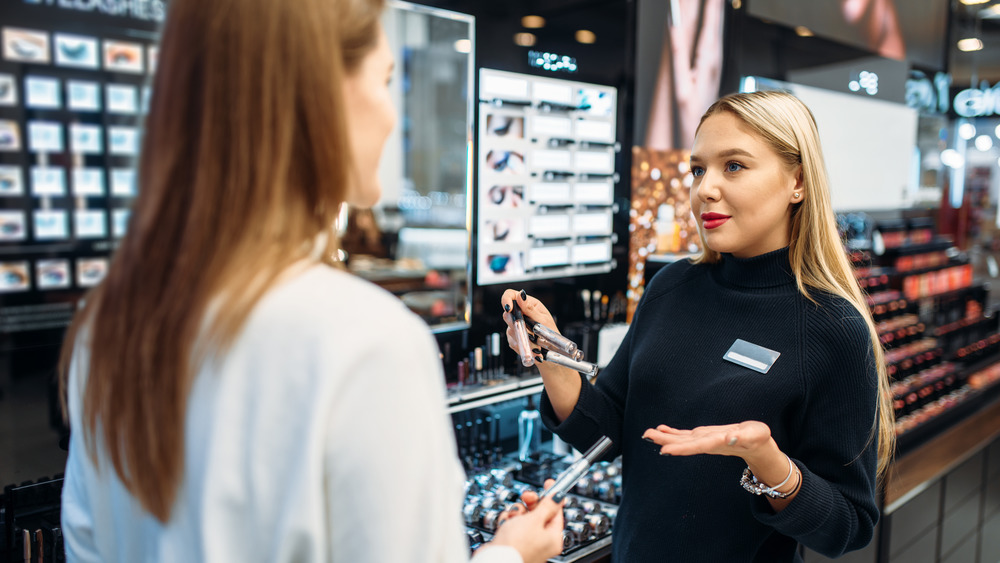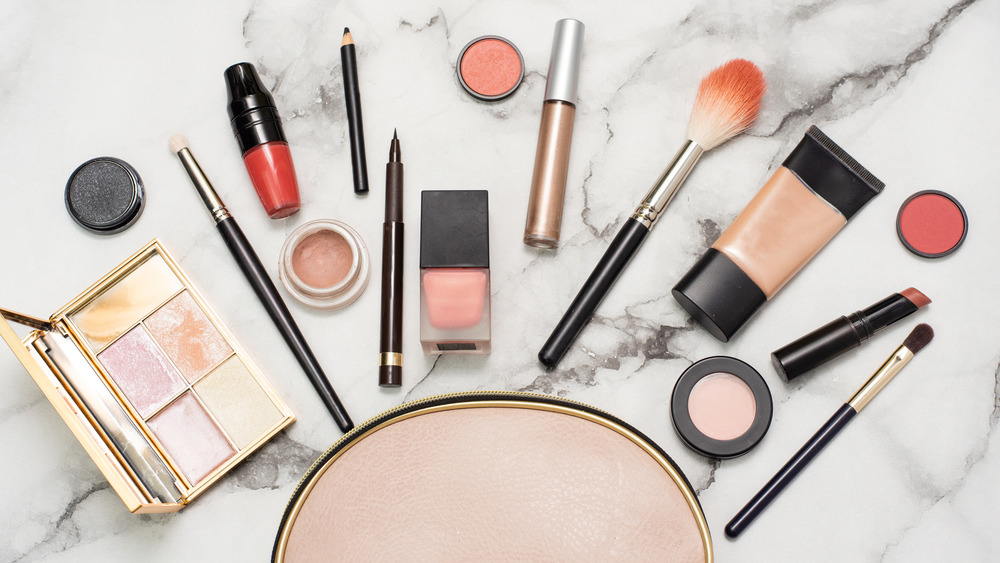Makeup You Should Never Use If You Have Oily Skin
We may receive a commission on purchases made from links.
No matter how you feel about makeup — if you're someone who follows all the trends and knows how to contour your face like a long-lost Kardashian sister or if you stick to the basics like concealer and mascara — you still might not know everything there is to know about makeup application.
The rules of makeup can be super confusing, as it kind of seems like they're constantly changing. But there are some hard and fast rules that never really change, especially when you look at the kind of makeup you should and shouldn't use for your specific skin type. Believe it or not, but there is plenty of makeup you should never use if you have oily skin, and for good reasons. So, if you've noticed some oiliness on your skin and are wondering what to steer clear of when it comes to makeup, read on because some of the products might surprise you.
If you have oily skin, keep it light with your makeup
Maybe the most important rule to follow when you have oily skin is to not overdo it with your makeup. Keep it simple, and keep it really light. The thing is, if you have oily skin, you're likely more prone to breakouts, so you don't need makeup products that clog up your pores. Fortunately, there are certain makeup products perfectly suited for oily skin, and even some that have breakout-fighting ingredients in them. Still, there are some things to stay away from.
Dr. Batul Patel, a medical director and dermatologist, told Vogue India that if you have oily skin, "You should be looking for products that are as light as possible, and hydrate the skin rather than moisturize it." Additionally, you can find products that have cleansing ingredients but don't over-dry your skin. Even with oily skin, over-drying it can cause more harm than good. So, avoid any foundation or makeup product that's too moisturizing or too drying. Balance is key.
Steer clear of this kind of primer
For many people, the first step in their makeup routine (after their skincare routine, of course) is to use a primer. Primer is great to help your makeup last longer, prep your skin, and basically provide your makeup with a clean palate to work with. However, if you have oily skin, there's one kind of primer that you should never use, though it might sound nice.
Specifically, dermatologist Dr. Debra Jaliman told Insider, "If you use makeup primer, be sure not to use hydrating primer products." If you see a primer that promises to be hydrating, avoid it. Instead, find one that advertises itself to be more "mattifying," as that will do the job without making your skin produce more oil than it already does and can help your makeup stay on longer. After all, makeup isn't going to last long or look too great on skin that's too oily or overly moisturized.
Anything with silicones is a no-go for oily skin, especially when it comes to primer
If you have oily skin, then you know you have oily skin. You're probably used to makeup not always staying put all day, having to blot away oil, and dealing with acne. And you might also know how important it is to find the right makeup for your skin type. But one ingredient lurking in a lot of makeup products can be pretty harsh on oily skin and it's pretty sneaky: silicones.
As Vogue India reported, silicones are super common in most beauty products, including hair care, skin care, and makeup products. Specifically, many primers use silicones as their main ingredient in order to help fill in fine lines and pores and make your makeup stay on longer and look better. Unfortunately, those silicones that make primer so great can also make oily skin more prone to irritation and breakouts. To check whether you have any silicones in your makeup, look for some other names silicones go by, such as dimethicone, cyclomethicone, cyclohexasiloxane, cyclopentasiloxane, and cetearyl methicone (via Healthline). If you see any of those ingredients in your makeup, put it down.
Oil-based foundations aren't a friend of oily skin
As obvious as it might sound, when you have oily skin, it's important to avoid makeup products that also have oil in them. Again, that sounds super clear, but you might not even be aware that the makeup products you're using have oil in them. After all, what good would that do anyone? But oil is in a lot of makeup, especially in a lot of foundations.
So, check the ingredients of your foundation and make sure the one you use isn't oil-based, as BuzzFeed noted. If it's oil-based, the second or third thing noted in the ingredients list will be a type of oil, as noted by L'Oréal's Makeup.com. On the contrary, you want to find a foundation that says it's long-lasting or one that has a more mattifying effect. When you have oily skin, more oil is just going to cause breakouts, but that's not all. It can also cause your makeup to smudge and wear off quicker, meaning you may have to re-apply it throughout the day. So, when it comes to foundation, don't use an oil-based product, and you'll be in the clear.
Avoid anything with a dewy finish
Just because you have oily skin that might be prone to breakouts or acne, that doesn't mean you can't wear makeup like anyone else. You can totally have fun and experiment with your makeup, but you should also not use anything that advertises a dewy finish, as opposed to a matte or regular finish.
According to cosmetics brand L'Oréal Paris, anyone with oily skin should try to avoid foundation with a dewy finish, as this will simply make your oily skin "look even shinier." Any kind of liquid or powder foundation with a so-called "radiant finish" or texture isn't suited for oily skin. It will only make your skin look greasy, so you might also want to stay away from highlighter or too many products with shimmer in them, as well, as oily skin tends to already look pretty shiny all on its own. Otherwise you could end up with a makeup disaster on your hands.
Foundation in general might not be the best idea
As basic as foundation might seem to any makeup routine, that doesn't mean it's necessary. If you have oily skin, foundation might not be worth it. Sure, it might be tempting to help cover up blemishes and red spots, or just hide any imperfections on your face, but wearing foundation every day isn't for everyone.
According to Allure, any foundation — even an oil-free, long-lasting formula — can still be too "heavy" for your oily skin. And when it's hot outside, that heavy foundation just "melts" away, leading to an even oiler mess that won't even stay put on your face. Additionally, according to skincare company Mario Badescu, a heavy, oily foundation on skin that's already oily will only make your skin oilier and lead to acne. So, instead of foundation, Allure recommends finding a tinted moisturizer to even out your skin tone, and that just might make your skin glow more than foundation anyway.
Artificial dyes in blushes can irritate your skin
While some people already prefer more natural makeup products, not everyone is the same. And really, most makeup is totally fine, whether it's from a drug store or a department store, unless you have a specific skin type, such as oily skin, to take into account. In that case, there are certain ingredients — like oil — that can cause big problems.
According to Vogue India, if you have oily skin, there is another important ingredient you really shouldn't put on your skin: artificial dye. Specifically, Vogue reported that D&C dyes, which have coal tar and petroleum in them, are in a lot of blushes and lipsticks and can really irritate your skin if it's already oily or prone to breakouts.
Now, it might seem impossible to avoid dyes in products like blushes or eye shadows, but you can totally find great products that don't use them. Look at brands for eyeshadows and blushes without harsh dyes like 100% Pure (via Elle). Your skin will thank you.
If you have oily skin, try not to use any makeup with fragrance in it
As it turns out, there tend to be more ingredients in makeup than you might think. In addition to artificial dyes and other potentially irritating ingredients, there are also fragrances in makeup products. It might seem strange for things like eye shadows or concealers to contain scents, but a lot of them do and you might not even know it.
But it's super important to be aware of such things, especially if your oily skin is sensitive to products. If that's the case, then you need to only be using makeup products that contain absolutely no fragrance, according to Hero Cosmetics. That's because fragrance can trigger irritation and lead to more breakouts or redness in oily skin, according to Healthline, which you obviously want to avoid. No matter what, fragrance-free makeup is often the best choice, so be sure to check you favorite products for known fragrance names to see if they are in the clear.
Don't use anything with alcohol on oily skin
It might sound strange that alcohol needs to be avoided on your skin when its oily, but it's true. When you think of alcohol, you might just assume that it's cleansing enough for it not to be an issue for oily skin, or that it might actually be beneficial. But quite the contrary is true. As it turns out, beauty products with alcohol aren't the best choice for people with oily skin.
Even famous makeup artist Jeffree Star reportedly avoids makeup with alcohol in it because it can be really damaging to your skin. And while cleansers and toners are the first things you might imagine when you think of alcohol as an ingredient, it can also be find in primers, setting sprays, and even sunscreens. So, when you're shopping for makeup, avoid anything with alcohol as a listed ingredient as it will actually clog your pores and might end up making you oilier than you were before.
People with oily skin should avoid makeup that contains parabens
The rise in popularity of more natural skincare and beauty products is no accident. As people are becoming more and more aware of what they put in their bodies with their diet, it's only natural they would also consider the products they put on their bodies. And if you have oily skin, it might pay off to be super vigilant with what makeup you use, especially makeup that lists parabens on its ingredients list. For anyone with oily skin, parabens are a no-go.
Tom Oliver, a nutritionist and personal trainer, described parabens as another on the long list of "artificial ingredients which can cause irritation and stress, especially to sensitive skin types," in an interview with Elle UK. Additionally, dermatologist Dr. Kemunto Mokaya told Hero Cosmetics that, though parabens might be described as simply preservatives, "They worsen acne because they mimic hormones (e.g., estrogen). Hormonal imbalances contribute to the development of acne." So even though it might take a little time and research, it will be so worth it to eliminate parabens from your makeup routine.
Try to find long-lasting formulas
Dealing with oily skin is no walk in the park, and it does require a bit of maintenance. You definitely have to have the right skincare routine down, but that's not all. When it comes to applying makeup to oily skin, it's key to find products that boast being long-lasting. In fact, no matter what primer you use, or how often you exfoliate, if your makeup isn't long-lasting, you'll be cheating yourself out of hours of makeup.
Anna De La Cruz, a licensed esthetician, told Dermstore that it's important for people with oily skin to find long-lasting formulas when they buy makeup. "Key product descriptors to look for when on the hunt for makeup products that work well with oilier skin types are: oil-absorbing, mattifying, oil-free and long-wear," Cruz said. Additionally, Cruz added that no matter what makeup you use, it won't look good or last long enough if you don't prep your skin properly by cleansing, exfoliating, and moisturizing on a regular basis. Oh, and using makeup primer and a setting spray won't hurt, either. So find makeup that claims to be long-lasting and your skin will be glowing. All day.
